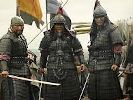Eye For Film >> Movies >> The Admiral: Roaring Currents (2014) Film Review
The Admiral: Roaring Currents
Reviewed by: Jennie Kermode

If a pass is narrow enough, wrote Sun Tzu in his analysis of different types of ground, ‘a single man defending it can check the onset of ten thousand.’ It’s a remark paraphrased early on here by the great Korean admiral Sun-sin (as portrayed by Choi Min-sik). Even he hesitates to take it too literally – yet the Battle of Myeongnyang, which this film portrays, is one of the few examples of it playing out in action in all of military history.
It took place in 1597, the fifth year of the Imjin War which saw Emperor Hideyoshi, widely celebrated for uniting the warring factions of Japan, overextend himself in an attempt to keep his military power base happy and set out to conquer China by way of the Korean peninsula. Surprised by their defeat at the Battle of Hansan Island (as told in Kim Han-min’s prequel to this film, Hansan: Rising Dragon), the Japanese withdrew for a time, but returned to deliver a heavy defeat to the Korean navy at the Battle of Chilchonryang (which was also spectacular and tactically interesting, but seems rather less likely to get the big screen treatment, at least from this team). This film picks up in its aftermath, when surviving ships were scattered and few remained seaworthy. The Japanese fleet was close to taking the capital (what is now Seoul), terror tactics had civilians and military personnel alike in a panic, and even the king had given up all hope of mounting a successful naval defence.

It’s a narrative made for the movies, and Kim knows exactly how to play it. Whilst the main focus is the admiral himself (with Choi as good as ever, keeping his character interesting even when he’s deliberately concealing both his agenda and his emotions), there are plenty of other characters to engage with. There’s the son who remains loyal but is tormented because he doesn’t understand, and the younger officer who might just be the only one who does, though a lot goes unspoken. There’s another man’s son, still wet behind the ears but desperate for a shot at vengeance; and there’s the brave scout parted from the woman who loves him, which everyone familiar with Korean cinema will know is going to end in heartbreak. The Japanese characters are given at least a bit of nuance, with an established admiral well aware of Sun-sin’s brilliance overruled by a spectacularly overdressed newcomer who styles himself the Pirate King. Whilst the latter is sometimes cartoonish in his monstrousness, there is a hint at the personal tragedy which motivated his real life equivalent, and the tension between the Japanese factions as things start to fall apart is well played.
No expense has been spared when it comes to the naval battle itself, which takes up the whole second half of the film and contains enough twists and turns to grip throughout. The pivotal role played by a whirlpool presents serious challenges and Kim works around them largely through suggestion, which is pretty effective, with the physical performances of extras at the oars and ropes helping to put across the intensity of effort required to resist its pull. The wooden ships from the period are painstakingly recreated, and although you will have to wait a long time to see Korea’s famous turtle ships do their thing, it’s worth it. There’s a good balance of action, character work and portrayal of tactics which invite viewers to try to out-think the main players just as they try to out-think one another.
Layered into all this is an understanding of the psychology of war which is rarely addressed so directly onscreen. It means that on the brief occasions when the films gets sentimental, we can understand these attempts to manipulate the audience in the context of Sun-sin’s efforts to manipulate his men (and thereby keep them alive). On the other side, the Japanese campaign of intimidation is very effective – real historical incidents are used to illustrate this – but there is disagreement between the admirals over the possibility that such an approach can be counterproductive if taken too far.
Kim’s attention to detail gives the film strong appeal to those with an interest in the history of the region, and it’s a must if you’re interested in battle tactics. It’s also an exciting action thriller which will have you on the edge of your seat. See it on the biggest screen you can.
Reviewed on: 07 Nov 2022
















